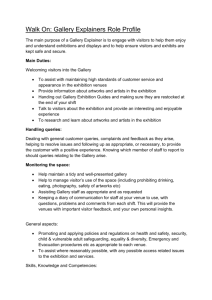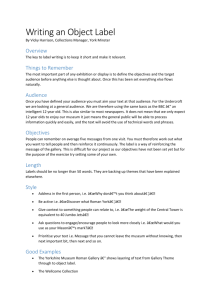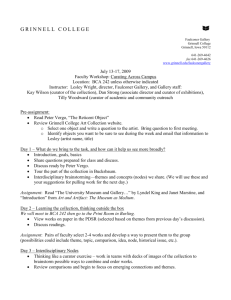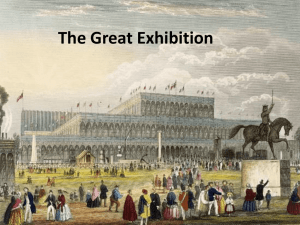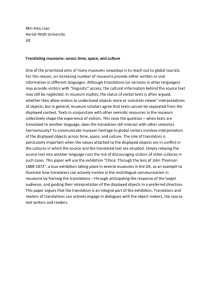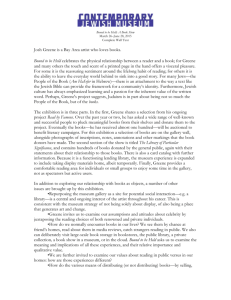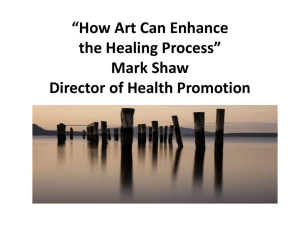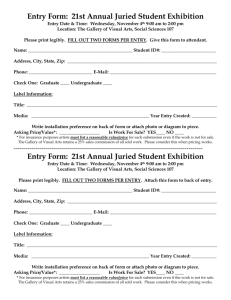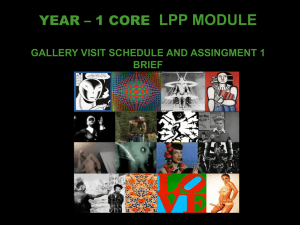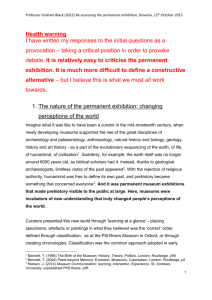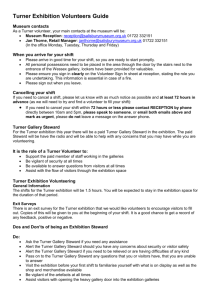Fall14 ART 342/542 EXHIBITION DESIGN
advertisement
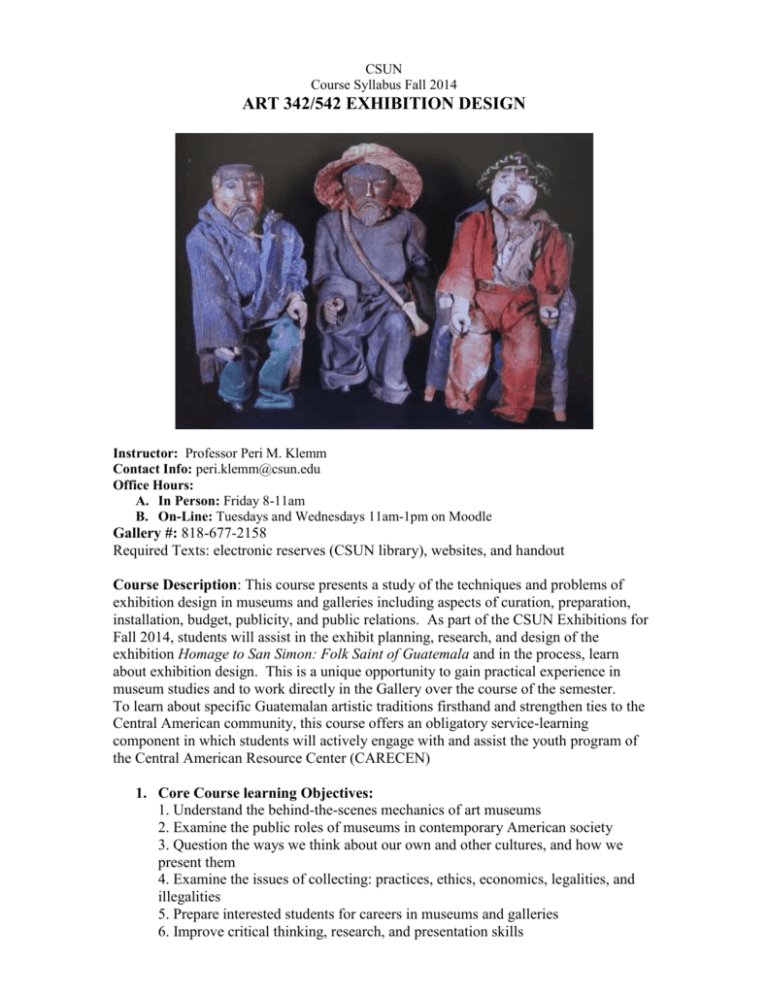
CSUN Course Syllabus Fall 2014 ART 342/542 EXHIBITION DESIGN Instructor: Professor Peri M. Klemm Contact Info: peri.klemm@csun.edu Office Hours: A. In Person: Friday 8-11am B. On-Line: Tuesdays and Wednesdays 11am-1pm on Moodle Gallery #: 818-677-2158 Required Texts: electronic reserves (CSUN library), websites, and handout Course Description: This course presents a study of the techniques and problems of exhibition design in museums and galleries including aspects of curation, preparation, installation, budget, publicity, and public relations. As part of the CSUN Exhibitions for Fall 2014, students will assist in the exhibit planning, research, and design of the exhibition Homage to San Simon: Folk Saint of Guatemala and in the process, learn about exhibition design. This is a unique opportunity to gain practical experience in museum studies and to work directly in the Gallery over the course of the semester. To learn about specific Guatemalan artistic traditions firsthand and strengthen ties to the Central American community, this course offers an obligatory service-learning component in which students will actively engage with and assist the youth program of the Central American Resource Center (CARECEN) 1. Core Course learning Objectives: 1. Understand the behind-the-scenes mechanics of art museums 2. Examine the public roles of museums in contemporary American society 3. Question the ways we think about our own and other cultures, and how we present them 4. Examine the issues of collecting: practices, ethics, economics, legalities, and illegalities 5. Prepare interested students for careers in museums and galleries 6. Improve critical thinking, research, and presentation skills 7. Participate in service through civic engagement 8. Create a successful exhibition 2. Art Department Program Learning Objectives: 1. Acquire a basic knowledge, theories, and concepts about art; develop a foundation of art skills and a high level of craftspersonship; communicate ideas and concepts through writing, speaking and art making; acquire a competency with the tools and technologies associated with the visual arts. 2. Broaden knowledge of ancient through contemporary art; develop an understanding of the theoretical, cultural, and historical contexts of art. 3. Explore and engage in interdisciplinary forms of art making. 4. Develop an appreciation and tolerance of diverse perspectives dealing with art, culture, teaching and learning. 5. Become involved in both individual and collaborative art experiences with other students, faculty, and community. Readings: All readings are located through Oviatt Library Course Reserves. They come from the recommended reading list below. All reading must be completed before the class session and students must be prepared to participate in class discussions. Recommended texts: Guatemala's folk saints: Maximon/San Simon, Rey Pascual, Judas, Lucifer, and others/ Jim Pieper, Pieper and Associates, 2002. Museum Frictions: Public Cultures/Global Transformations /edited by Ivan Karp (et. al) Duke University, Press, 2006. Exhibiting Cultures : The Poetics and Politics of Museum Display / edited by Ivan Karp and Steven D. Lavine Washington : Smithsonian Institution Press, 1991 Museums and Communities : The Politics of Public Culture / edited by Ivan Karp, Christine Mullen Kreamer, and Steven D. Lavine. Washington : Smithsonian Institution Press, 1992. Primitive Art in Civilized Places / Sally Price. University of Chicago Press, 1991. Judging Exhibitions: A Framework for Assessing Excellence. Beverly Serrell. Walnut Creek, California: Left Coast Press, 2006. Course Break-Down: 10%- Class Participation and Presentations 10%- Gallery Work 20%- Service Learning Project 10%- Service Learning Journal 10%-Exhibition Critique 20%- Exhibition Project 20%- Midterm Exam Exhibition Project: This assignment will be gone over in detail and class. You will submit you project as a paper/creative work at the end of the term. Modes of documentation may include: drawings, photographic material, multi-media material, quantitative data, qualitative data, 3D models or prototypes, web-based material, and/or text. Gallery Work: Each student will devote 2-3 hours this term to work in the Gallery. This work is separate from service learning and could include but is not limited to: receiving works of art, filing out condition reports, helping with the framing and installation of works of art, assisting with the taking down of an exhibition, opening/closing of an exhibition. Service Projects: Course projects will be conducted with the youth organization of the Central American Resource Center (CARECEN) in Los Angele as part of the servicelearning component of this course. There are three parts to this project: a) Service. Service includes twenty hours of time devoted to the needs of the Center b) Writing. Writing includes journal entries original fieldwork and research. c) Reflection. Critical and personal reflection of the service-learning experience will also be required. Each component of this project will be gone over in detail in class. Exam: There will be one midterm examinations that will test your ability to integrate the material you have studied. It will include short answer essays. There will be no makeups or substitutions for the midterm. Attendance: You are responsible to attend each class. Regular class attendance is extremely important for a successful semester. A student who accumulates three classes of absenteeism in a class during an academic semester will receive one lower grade. A student who accumulates more than three classes of absenteeism in a course will receive two lower grades. Tardiness: Lateness to class or from the break disturbs your classmates and professors. Therefore, it is not acceptable and will be counted as an absence. Please let me know if you foresee the need to arrive late or leave early before the designated class. Assigned Readings: All assigned readings are required and should be completed before the class meeting for which they are assigned. Be prepared for weekly in-class reading discussions and quizzes. Bring the text to class. Students with Disabilities: Students with disabilities who wish to request accommodations should discuss these requests with the instructor as early as possible. Student Services can also provide more specific information with respect to the existence and location of services, activities, and facilities that are accessible to and useable by persons with disabilities. Course Schedule Week 1 (Aug 29)- Introduction, Course Overview, Service Learning. Director Jim Sweeters will introduce us to the Galleries with a facilities tour. Assignment: read course syllabus (check course requirements, dates, and readings to be sure this course is right for you) Week 2 (Sept 5)- The Epistemologies of Museum Display Suggested Project Topics. Guest curator and museum director Bill Mercer will discuss the overarching structure of museums and staff. Assignment: 1. find two museum careers that interest you (ex. archivist, curator, registrar, conservator, executive director, program manager, gallery educator, exhibit designer,/installer, librarian, accounting officer, tour coordinator, director of development, grant writer, outreach and community education coordinator, membership coordinator,etc). Write down and bring to class a description of the job, the average starting salary, the job skills and degree needed. Check out: http://museumstudies.si.edu/courses.html 2. Reading Packet #1 (see reading handout) Week 3 (Sept 12)- When One is Many. Who is Maximon/San Simon? Assignment: 1. turn in project topics and timeline 2. Reading Packet #2 Week 4 (Sept 19)- Art In and Out of Context with Non-Western Art Specialist John Buxton from The Antiques Roadshow Assignment: 1. Reading Packet #3 Week 5 (Sept 26)- Religious Syncretism in the Museum Assignment: 1. Reading Packet #4 Week 6 (Oct 3)- Fieldtrip to the Fowler Museum, UCLA Viewing of ‘Sinful Saints and Saintly Sinners at the Margins of the Americas’ Meeting with curator, Gemma Rodriguez Assignment: 1. Reading Packet #4 Week 7 (Oct 10)- Preparation and Conservation Aspects of Exhibition Design. Guest lecture, Conservator/Art Restorer Bita Duck. Midterm Exam Review Assignment: 1. Exhibition Critique Due Week 8 (Oct 17)- Midterm Exam Week 9 (Oct 24)- Exhibition Preparation Assignment: 1. Reading Pacekt #5 Week 10 (Oct 31)- Gallery Tour with Service Community Week 11 (Nov 7)- Art making workshop with Service Community Week 12 (Nov 14)- Art education workshop with Service Community Week 13 (Nov 21)- Project Workshop Week 14 (Nov 28)- Thanksgiving Recess. No class. Week 15 (Dec 5)- Student Presentations of Projects Assignment: 1. Service Learning Journal Due Week 16 (Dec 12)- Student Presentation of Projects Assignment: 1. Exhibition Project Due

